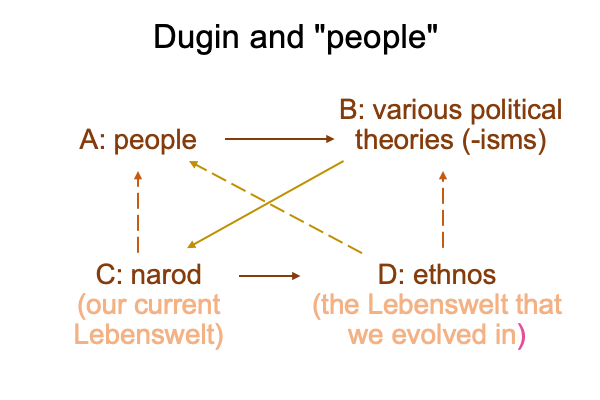0132 All the blogs for February 2023 at www.raziemah.com examine selected chapters from Michael Millerman’s book (2022) Inside “Putin’s Brain”: The Political Philosophy of Alexander Dugin. Millerman has been studying Dugin’s works for over a decade. If there is to be a truly philosophical underpinning to Eurasianism, then Dugin begins the quest.
As for this reviewer, my first endeavor to read Dugin, Comments on Alexander Dugin (2012) Fourth Political Theory, may be found at smashwords and other e-book venues. I ask the question, “If I were to say what Dugin is saying, using triadic relations, then how would that work?” The answer intrigues.
Obviously, I am not interested in whatever box the literati of modern political philosophy want to put Dugin in. I am interested in the purely relational structures that Dugin reveals.
0133 So far, I reviewed chapters two and six. In this blog, I will briefly touch on chapter nine. Well, less that that. I see a Greimas square in the seventh section of chapter nine. Its title is “Theologico-Political Implications”.
In this section, Millerman hones down on the difference between the Heideggerian Left (HL) and Heideggerian Right (HR) in regards to the theological-political issue of the returning of the religious and the receding of the secular.
0134 Recall, Dugin’s formulation of “the people” associates to the following Greimas square.

0135 A is the focal term, “the people”. What is the political expression of the people? In America, the Declaration of Independence starts with “we, the people”. So the answer is involved. Suffice to say that, until recently, the political expression is the democratically elected representative. Until recently? Mailing out unsolicited ballots is unconstitutional. It makes me wonder, what do modern intellectuals mean when they say the word, “democracy”.
B contrasts with A. Here, the three political theories (of liberalism (1), communism (3), fascism (2) and big government (il)liberalism (1, again)) model phenomena of a prepolitical world in terms of the individual (1, 1-again), class membership (3) and citizenship and noncitizenship (2).
C contradicts B and implicates A. Dugin uses the Russian word, “narod”, for prepolitical people that various schools of modern political philosophy regard as noumenon. The people (A) are political. The narod (C) is the people before being objectified by explicit political theories. For me, the narod (C) is humanity in our current Lebenswelt.
D contrasts with C, contradicts A and implicates B. Dugin uses the Russian word, “ethnos“. The narod (C) comes out of the ethnos (D) and cannot return. To me, the ethnos (D) is us in the Lebenswelt that we evolved in. Our current Lebenswelt (narod (C)) is not the same as the Lebenswelt that we evolved in (ethnos (D)). The hypothesis of the fist singularity contributes an evolutionary dimension that complements Dugin’s theologico-political analysis.
